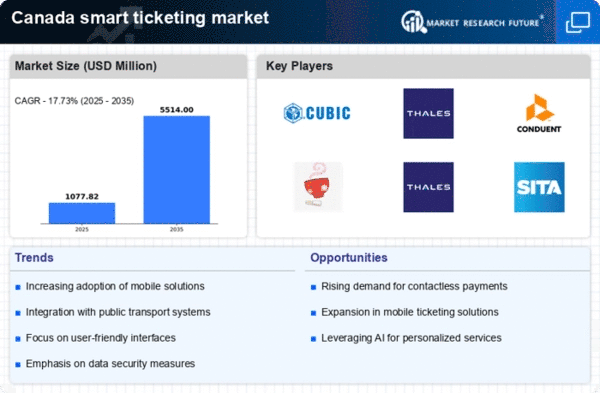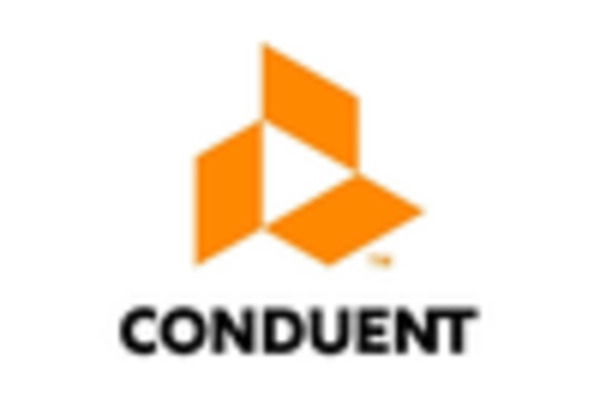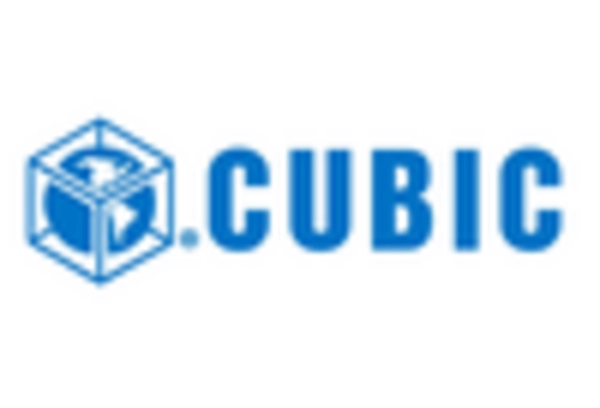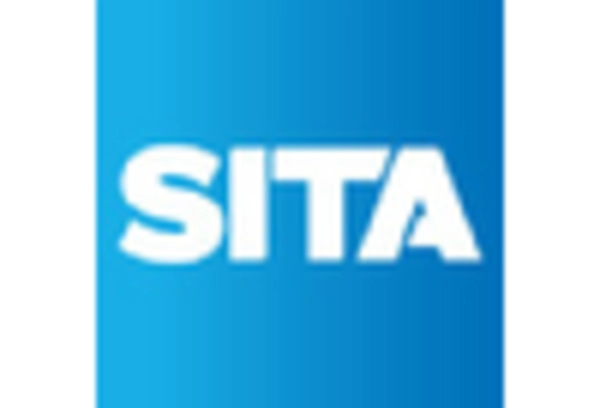Government Initiatives and Funding
Government initiatives play a crucial role in the expansion of the smart ticketing market in Canada. Various provincial and municipal governments are investing in smart transportation infrastructure to enhance urban mobility. For instance, funding programs aimed at modernizing public transit systems are becoming more prevalent, with allocations reaching upwards of $500 million in recent years. These investments are designed to facilitate the implementation of smart ticketing solutions, which are seen as essential for improving efficiency and user experience. Additionally, government support for research and development in this sector is likely to foster innovation, further driving the market's growth. As public authorities prioritize sustainable and efficient transport solutions, the smart ticketing market is expected to benefit significantly from these initiatives, leading to a more integrated and user-friendly transit experience.
Rising Urbanization and Commuter Demand
The increasing rate of urbanization in Canada is a significant driver of the smart ticketing market. As urban populations grow, the demand for efficient public transportation systems intensifies. By 2025, it is projected that over 80% of Canadians will reside in urban areas, leading to heightened pressure on existing transit networks. This demographic shift necessitates the adoption of smart ticketing solutions to manage the influx of commuters effectively. Enhanced ticketing systems can streamline operations, reduce wait times, and improve overall user satisfaction. Moreover, the smart ticketing market is likely to evolve in response to the changing needs of urban commuters, who increasingly seek convenience and flexibility in their travel options. Consequently, the market is expected to expand as transit authorities implement innovative solutions to accommodate the growing urban population.
Focus on Data Analytics and User Insights
The smart ticketing market in Canada is increasingly leveraging data analytics to enhance service delivery and user experience. Transit authorities are recognizing the value of data in understanding commuter behavior and preferences. By analyzing travel patterns, they can optimize routes, schedules, and pricing strategies. As of 2025, it is estimated that over 50% of transit agencies in Canada are utilizing data-driven insights to inform their decision-making processes. This focus on analytics not only improves operational efficiency but also allows for personalized services that cater to individual user needs. Consequently, the smart ticketing market is likely to expand as agencies invest in advanced analytics tools and technologies, enabling them to respond more effectively to the dynamic demands of commuters.
Technological Advancements in Payment Systems
The smart ticketing market in Canada is experiencing a surge due to rapid technological advancements in payment systems. Innovations such as Near Field Communication (NFC) and mobile wallet integration are enhancing user convenience and security. As of 2025, it is estimated that over 60% of public transport transactions in major Canadian cities utilize contactless payment methods. This shift not only streamlines the ticketing process but also reduces operational costs for transit authorities. The integration of advanced technologies is likely to attract more users, thereby expanding the smart ticketing market. Furthermore, the ongoing development of secure and efficient payment solutions is expected to bolster consumer confidence, leading to increased adoption rates across various demographics. Consequently, the smart ticketing market is poised for significant growth as these technological innovations continue to evolve.
Consumer Preference for Seamless Travel Experiences
Consumer preferences are shifting towards seamless travel experiences, which is significantly influencing the smart ticketing market in Canada. Modern travelers increasingly expect integrated solutions that allow for easy transitions between different modes of transport. This trend is evident in the rising demand for multi-modal ticketing options, which enable users to combine various transport services into a single journey. As of 2025, surveys indicate that approximately 70% of commuters prioritize convenience and efficiency when choosing their travel options. This consumer behavior is prompting transit authorities to adopt smart ticketing technologies that facilitate smoother travel experiences. The smart ticketing market is likely to benefit from this trend, as providers develop solutions that cater to the evolving expectations of users, ultimately enhancing customer satisfaction and loyalty.
















